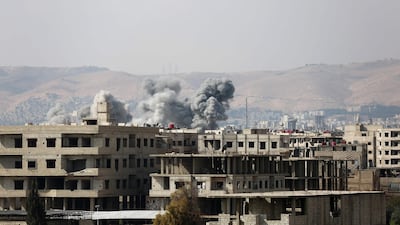The hideous carnage in Eastern Ghouta is the latest instance of unbridled brutality and calculated, intentional war crimes in Syria. This is among the worst humanitarian disasters anywhere since the Second World War. The guilty parties have a terrible account to settle.
At least 400,000 people, most of them civilians, have been killed. When the war began in 2011, Syria's population was about 22 million. Almost half of them, more than 10 million, have been displaced. Almost five million are refugees in neighbouring countries, with 6.3 million more internally displaced, and often hardly better off.
And while there have clearly been atrocities and war crimes on all sides of the conflict, it is indisputable that the overwhelming bulk of the brutality has been inflicted by the Syrian regime, and its confederates, against its own people.
ISIL, Al Qaeda and various rebel factions have certainly played their part, but the driving force of the carnage has always been, and remains, a vicious dictatorship willing to do anything to cling to power. Yet the regime is not the only responsible party. Bashar Al Assad was unconditionally supported from the outset by his regional and international masters.
In the summer of 2015, Iran realised Mr Al Assad was on the brink of defeat. It dispatched a top general, Major General Qassem Suleimani, to Moscow. Russia and Iran then organised a joint intervention, with tens of thousands of fighters from Hezbollah, sectarian militias from Iraq, Pakistan and Afghanistan and Russian mercenaries, descending on Syria.
From the latter months of 2015 until the decisive turning point in the war, the fall of Aleppo in December 2016, this cynical syndicate of death, led by Russia in the air and at the negotiating table and by Iran and Hezbollah on the ground, kept their client in power by unleashing untold mayhem.
Between them and some of the rebel groups, especially ISIL, no crime or abuse has been overlooked in Syria.
The regime runs one of the world's most extensive programmes of systematic torture and murder of helpless detainees. The appalling photographs revealed by "Caesar", a regime defector who had been paid to document these horrors like accomplishments, are merely the tip of the iceberg.
Chemical weapons, barrel bombs, Russian fighter jets, artillery barrages and so much more have been unleashed on towns and cities, schools and hospitals, and anything that moves in any part of Syria that has not surrendered to pro-regime forces.
Because of this onslaught, the regime will survive for the meanwhile, but the war will continue, and the ultimate outcome will look very different.
In the meantime, it is essential that the international community and the Arab world pay strict attention to what is happening in Syria, lay the groundwork for future war crimes prosecutions, and hold all the guilty parties to account insofar as and whenever reasonably possible.
Obvious instruments like the International Criminal Court are probably effectively blocked because Syria is not a signatory to its charter and Russia would veto any Security Council effort to introduce justice into the equation. But we should all assume that other mechanisms, such as an ad hoc tribunal or a responsible country invoking universal jurisdiction, to hold the guilty to account will eventually emerge.
While the regime may survive, it will never be considered legitimate by most Syrians, and it must not be treated as a respectable by the international community, especially Arab countries. And the threat of criminal prosecutions of some kind must forever haunt the guilty parties.
They include individuals, serving either the regime or rebel groups, who murder and torture with their own hands, and the commanders on all sides who direct such brutality.
But it must not stop there. Justice must also always await senior regime figures, including Mr Al Assad, who authorise and administer the slaughter.
Foreigners who have played a key role in the tragedy of Syria cannot be immune because they are not Syrians. On the contrary, such outsiders can't even claim their brutality was driven by unrestrained zeal and excesses in defending their own communities.
Their actions are entirely cynical statecraft. Their culpability for these deliberate, calculated war crimes is therefore greater.
On that basis, Russia is most guilty of all. Its interests in Syria are clear, but so is its responsibility. Untold numbers of Syrians would likely be alive at homes if not for the Russian-coordinated international invasion and brutalisation of their country.
Russia has never faced the consequences nor public anger for this. That should end, it does not merit such impunity. Yes, Russia has once again risen as a player in the Middle East. It must again be reckoned with. But it has done so by creating chaos and bloodshed.
The ultimate villain in Syria’s nightmare isn't Mr Al Assad or Ali Khamenei. It's Vladimir Putin. The international community needs to recognise and remember that.
Hussein Ibish is a senior resident scholar at the Arab Gulf States Institute in Washington, DC


